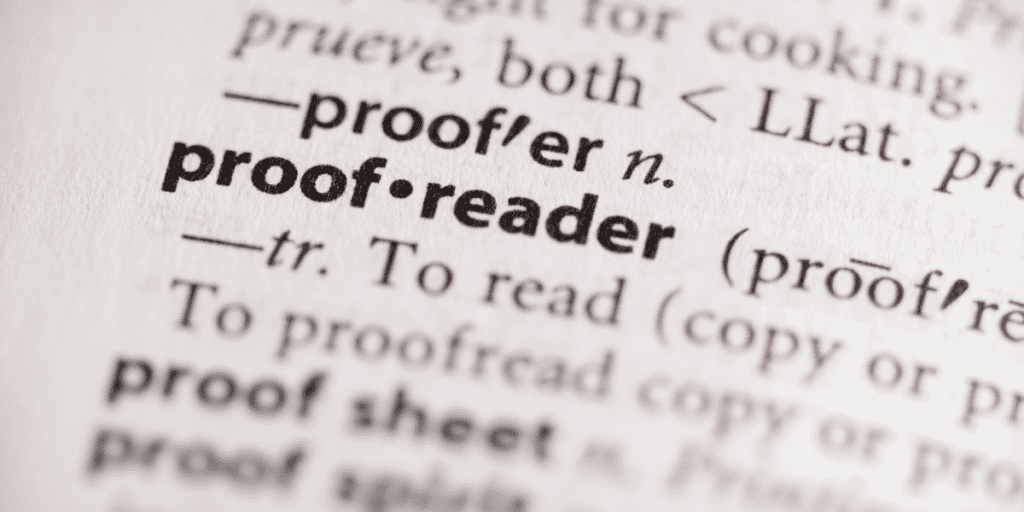4 Easy Tips for Proofreading Your Own Writing
This post: Tips for proofreading your own writing, & when to do it. (Hint: always.)
Should you proofread your own writing? Short answer YES.
Even if you have “spell check” on your laptop? Yes. Even if you have the Grammarly app? Yes. Even if you have autocorrect on your phone? Ummm, a million times yes.
Tips for Proofreading at a Glance:
- When to Proofread Your Own Writing
- When to Hire a Professional Proofreader
- 4 Easy Tips for Proofreading Your Own Work
When to Proofread Your Own Work
You should absolutely proofread what you write:
- BEFORE you hit “send” on that next email
- BEFORE you post that next blog article
- BEFORE you share that next Instagram reel or post
- BEFORE you send that next text, or throw any of your words into the world
When to HIRE a Professional Proofreader
If you’ve written an ebook, built a website, or created a digital product, proofreading your own writing is the first step. Not the last.
One of my best tips for proofreading? -> Always get another set of eyes on your work before you publish, sell, or market anything. (Yes, I’m a professional proofreader. Yes, you can hire me to proofread your stuff.)
But learning a few tips for proofreading your own work will save you time, money, & probably a bit of embarrassment (because you’ll catch typos before they go dancing into the world).
Another perk: Professional, compelling, concise copy will connect with & motivate your readers to take action (e.g., buy your stuff).
So here goes:
4 Easy Tips for Proofreading Your Own Work
Do the muscle work yourself – it’s worth it, I promise.
1) Read Your Copy Out Loud
This one step will level up your writing more than you can imagine! Copy can “sound” amazing when you read it inside your head. (I mean, you know exactly what you mean, right?)
But hearing what you wrote is quite another story — & more closely mirrors how your readers will consume it.
Read aloud your own copy, then tweak it like crazy.

2) Check Punctuation
Don’t overthink this. I’m not talking about properly placed semicolons, or figuring out if you need to use an em dash or an en dash. (That’s a pro proofreader or copy editor’s job.)
But make sure your sentences have an end mark – that would be a period, 99 percent of the time. (Unless you’re asking a question, then you know what to do.)
Bonus tip: always, always, always begin your sentences with a capital letter. (Thank you, I feel better already.)
Tips for Proofreading
3) Read the Writing Backwards
I know, this sounds weird. And it’s not going to make a lick of sense. But it’s a golden way to pick up on any misused, misspelled, missing, or duplicated words within your copy.
It’s kind of like zooming in & wriggling each & every bulb on a strand, trying to figure out which one is causing the short on your Christmas tree lights. (Remember those days?) If you want the proverbial lights to stay on when people read your copy, take the time to check each word.
Tips for Proofreading
4) Double Check for Tricky Word Errors
As a grammar nerd & proofreader, these are the copy boo boos I see the most.
Thankfully, they’re easy to fix & pretty easy to understand (so you don’t keep making them). Here are eight pairs (or sets) of commonly misused words in copy.
Your & You’re
Your is a possessive pronoun; it means something belongs to someone. Is this your house?
You’re is a combo of the words “you” & “are.” If you could also say “you are,” then use the “you’re” form. You’re kidding.
Their, There, & They’re
Their is also a possessive pronoun, only plural this time. Is that their house?
There means a location or position. (Easy hack: “there” has the word “here” inside it.) I can’t tell if you’re going here or there.
They’re is a combo of the words “they” & “are.” Use it anytime you could also say “they are.” I can’t tell if they’re going here or there.
Too & To
Too indicates something is excessive (use it if you could say “also”), or means “in addition to.” Are you going to the party, too? I’m not going; there will be too many people.
At the risk of sounding like the nerd that I am: To can be a preposition, infinitive marker, or adverb. Use the word “to” any time you’re not talking about “too” (as in too many). Are you going to the party, too?
Affect & Effect
This one is tricky! Effect is the change or result of another action. What kind of effect did that have on her kids?
Affect means to make a difference or have an effect on. Living in a foreign country as a child definitely affected me.
Cheep & Cheap
Cheep means a squeaky, shrill sound (or the act of making said sound). The baby bird’s cheeping kept me up all night!
Cheap means not expensive, or not of good quality. Please don’t buy any more cheap pens.
Grate & Great
Grate means to rub on a grater (e.g., grate the cheese), or to invoke an unpleasant emotion or reaction (e.g., grate on my nerves). Oddly enough, to be “grateful” means to appreciate something. I’m so grateful for this new electric grater.
Great means above average in quality, importance, or size. My great-grandma always says great things about Ivan the Great.
Hart & Heart
Hart is an often misspelled version of “heart.” It’s actually an old word that means “a male deer or stag.” As the hart pants for the water. Psalm 42:1
Heart is the organ that pumps blood throughout your body; also can refer to the central part of something, or to have courage or grit. The heart surgeon showed so much heart when she checked in with me six months post–surgery.
Herd & Heard
Herd is a large group of animals, or is used in reference to people or things all moving in the same direction. The cowboys had to herd the herd of cows along the Chisholm Trail.
Heard means to hear or be informed of. (Hint: has the word “hear” inside it.) Have you ever heard of herd immunity?
Speech & Speach
Speech means language, the ability to express thoughts or feelings, or a formal address. Her eloquent speech denotes her refined upbringing.
Speach is not a word, just a misspelling of “speech.” (Ooopsies.)
Think & Thank
Think means a thought process, belief, or to ponder something. Do you think you could take a look at my rough draft today?
Thank means to express gratitude for something. I think I’ll write those thank you cards this afternoon.
Tell me.
What other tips for proofreading work for you? What would you add to my list?
